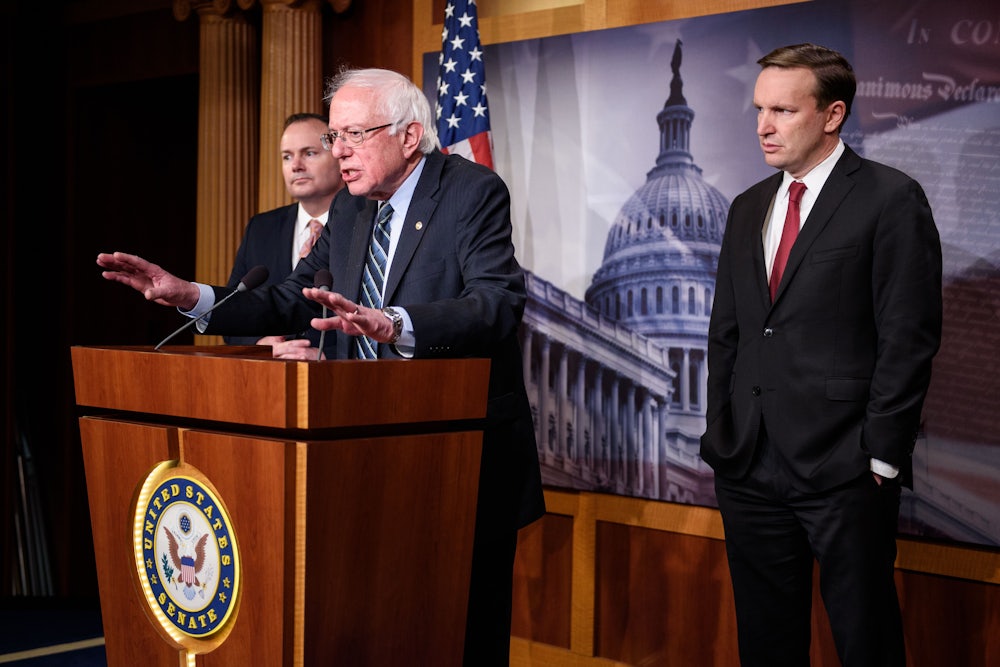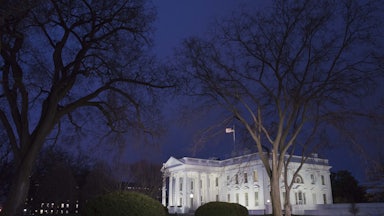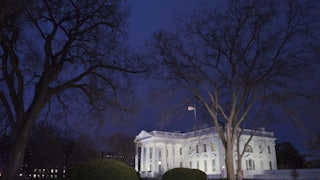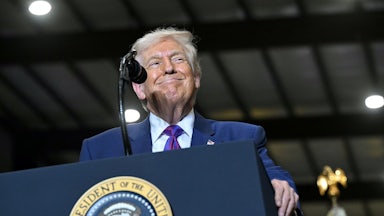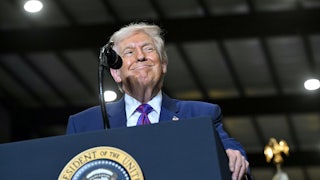This lame-duck Congress has a lot on its plate, and many of these items have received considerable coverage: the repeal of the Defense of Marriage Act, reform of the Electoral Count Act, and, as always, government funding.
But there’s one more issue sitting before the House right now that deserves attention. Several important bills to reform emergency powers are ripe for consideration before the lame-duck session of Congress and could be incorporated into any omnibus legislation. A common and sensible feature of these proposals would set an automatic 30-day limit for presidentially declared emergencies unless Congress votes to approve an extension and would also require that Congress be informed of actions taken pursuant to the emergency. The proposals enjoy wide bipartisan co-sponsorship, including by Senators Bernie Sanders, Chris Murphy, and Mike Lee.
This action would represent the first tightening of exceptional powers since the 1976 National Emergencies Act, when Senator Frank Church warned that emergency powers were “like a loaded gun lying around the house, ready to be fired by any trigger-happy president who might come along.”
The Trump presidency was a giant stress test of our constitutional order, revealing numerous leaky valves. Two impeachments, exorbitant assertions of executive privilege, plans to short-circuit the Electoral College, an actual insurrection directed by the president against Congress, and bold claims of vast presidential emergency powers vexed the nation for four years. The republic got through the Trump ordeal but only by the skin of our teeth.
There is no reason to believe that the constitutional threat posed by a president like Donald Trump was a one-off. Despite the passing of the immediate crisis, efforts to plug the constitutional holes, such as the aforementioned proposals to reform the shaky 1887 Electoral Count Act, merit urgent and sustained attention.
If passed, the reform package would reduce the risk of prolonged rule by emergency decree and should enjoy bipartisan support, but it does not go far enough. The architecture of emergency powers under the U.S. Constitution will remain open to abuse without further clarification and oversight.
Democracies have long grappled with the conundrum of emergency powers. The question is whether extraordinary situations—natural disasters, wars, insurrections—should permit exceptional suspension of civil rights. And if so, how can those powers be constrained under law?
The answers are complex across democratic legal systems. In 1850 British Prime Minister William Gladstone argued that in times of necessity, the Crown and colonial governors had “inherent powers” to declare martial law. Gladstone glossed such necessity situations as “above the law.” The U.K. imposed martial law in Ireland under the Emergency Acts a century ago. While these laws were arguably in accord with the principle of royal prerogative under Britain’s unwritten constitution, the unchecked power to go “above the law” is hard to square with the rule of law.
Written constitutions are not necessarily better at preventing the risks of abuse of power. In interwar Germany, the Weimar Constitution expressly provided for emergency powers and rule by decree under Article 48—known as Ausnahmezustand or “state of exception.” With the help of reactionary jurists such as Carl Schmitt, this clause eventually opened the door to the systematic unraveling of civil liberties and the superficially lawful rise of the Nazi dictatorship.
In the U.S. context, emergency powers have repeatedly surfaced as a constitutional riddle since the Civil War. In cases of invasion or rebellion, Congress has authority to suspend “the privilege of the writ of habeas corpus,” the right to challenge detention and seizures. Early in the Civil War, President Lincoln briefly but unilaterally seized ships and suspended habeas corpus. During World War II, the United States interned Japanese Americans and confiscated their property without due process, an action the Supreme Court disgracefully approved of in its 1944 Korematsu decision, which was disavowed only in 2018.
More recently, both the Covid-19 pandemic and the January 6 insurrection crisis have heightened awareness of the problem. Libertarian groups questioned the authority of the state to impose public vaccination requirements, and President Trump explored the use of emergency powers to interfere with the certification of the election.
Trump even declared that the president’s “authority is total” and insisted, “I have the right to do a lot of things people don’t even know about.” Trump was eerily echoing a line from the 1962 film The Manchurian Candidate, in which the master coup plotter played by Angela Lansbury speaks of imposing powers that “will make martial law seem like anarchy.” Despite warnings from civil society and journalists, Trump’s authoritarian intentions were not taken seriously until it was almost too late.
Under the Constitution, there are two pathways to presidential emergency authority: powers delegated by Congress and powers inherent in the office of the chief executive. These are called Article 1 and Article 2 powers, respectively, for the sections that deal with the legislative and executive branches.
These two sets of powers pose related but distinct challenges. Because Article 1 emergency powers have been delegated to the president, Congress retains oversight responsibility. New York University Professor Liza Goitein, an emergency powers expert at the Brennan Center for Justice, has cataloged over 120 known statutory delegations and many unexpired national emergencies. Indeed, the U.S. finds itself in a seemingly permanent state of emergency. Some of the most sweeping delegations, such as the International Emergency Economic Powers Act and the Patriot Act, also blur the lines between national security, where the president has broadest authority, and domestic affairs, where constitutional protections should reign supreme.
The main problem with these mushrooming delegated powers is the failure of Congress to exercise oversight in a regular and timely fashion. This could be due to lassitude or the desire to shirk responsibility for tough questions. A similar situation has arisen with respect to war powers, which Congress has all but abdicated to the president. These derelictions of duty by Congress amount to constitutional amendment by default, effectively redistributing powers.
The second, and knottier, source of presidential emergency powers is under Article 2, and these involve supposedly inherent powers of the chief executive. The existence of such powers is itself controversial. If inherent powers exist, why are delegated powers even needed? But if they do exist under the Constitution, how do we know what they are and how can they be checked?
Inherent or implied presidential powers echo the notion of royal prerogative and do not sit comfortably in American constitutional jurisprudence or the principles of the nation’s founding. True, the commander-in-chief clause places the president at the top of the military command hierarchy in times of war, but it is a far stretch to infer broad inherent emergency powers.
Yet, starting with Alexander Hamilton, defenders of inherent powers point out that Article 1 “vests” Congress with enumerated powers “herein granted,” while Article 2 contains no such limiting modifier in vesting presidential powers. This difference of phrasing—so the argument goes—means that the president’s powers are not limited to delineated powers.
A particularly concerning and opaque area of implied presidential powers is a legacy of the Cold War and relates to numerous Presidential Emergency Actions Documents, or PEADs; Special Access Programs, or SAPs; and executive orders relating to national security and so-called “continuity of government” in case of nuclear war or other major physical disruptions.
What is to be done about claims of special powers? The short answer is that the other two branches must speak up—both Congress and the courts have key roles. The Congress has authority to seek transparency from the executive and needs to use it. It is imperative to develop a framework of legal standards for the exercise of any inherent Article 1 powers. Such standards can be proposed by Congress as it has an interest in checking executive overreach.
Ultimately, however, main responsibility for resolving separation-of-powers disputes rests with the judiciary, which Hamilton famously called “the least dangerous” branch. Courts are often shy about “political questions,” but the fate of democratic governance could depend on increasing judicial assertiveness about tests for the legitimacy of emergency powers as cases present themselves.
Jurists are good at designing multifactorial balancing tests to evaluate the constitutionality of laws and policies. For example, Berkeley Law Dean Erwin Chemerinsky has proposed that factors to test assertions of implied powers could include the degree of consistency with the constitutional separation of powers, interference with the functioning of other branches, and undermining of government accountability. Because the U.S. is a federal system, thought must also be given to the emergency powers of state governors, which are broad and vary from state to state, and similar legal standards should apply to them.
Of course, laws are not self-enforcing, and no legal system can provide full protection against an unscrupulous chief executive. Furthermore, it is reasonable to be concerned about the current Supreme Court majority, stacked with right-wing justices who have already overturned Roe v. Wade. Good faith is required of all officials entrusted with upholding the constitutional order.
Emergency powers are necessary but pose serious challenges for the rule of law. A democracy must ensure that the use of those powers is always safe, rules-bound, and rare.
